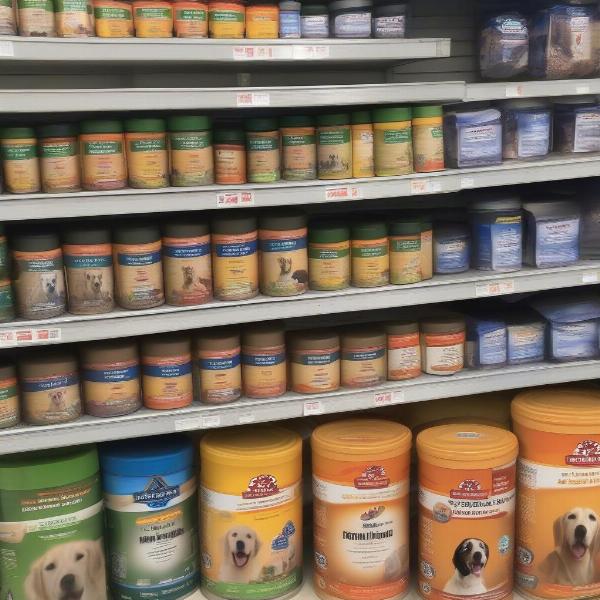Dog food powder is a convenient and versatile option for supplementing or even replacing traditional kibble or wet food. It offers a concentrated source of nutrients and can be particularly useful for picky eaters, dogs with dental issues, or those needing a nutritional boost. Understanding the different types, benefits, and potential drawbacks of dog food powder can help you make informed decisions about your dog’s diet.
Understanding the Benefits of Dog Food Powder
Dog food powder offers several advantages over other food formats. For fussy eaters, it can be easily mixed with existing food to enhance palatability. Its concentrated nature makes it ideal for travel, and it can be particularly helpful for dogs recovering from illness or surgery. Powdered supplements can also target specific nutritional needs, like joint health or skin and coat condition.
Different Types of Dog Food Powder
There are various types of dog food powder available, catering to different needs. Some are complete and balanced meals, while others are designed as supplements.  Different types of dog food powder Common types include:
Different types of dog food powder Common types include:
- Complete meal replacements: These powders provide all the necessary nutrients for a dog’s daily needs and can be mixed with water to create a complete meal.
- Protein supplements: These are designed to boost protein intake, often beneficial for active dogs or those on restricted diets.
- Specific nutrient supplements: These target specific health concerns, such as joint health, digestive issues, or skin and coat health. Examples include kelp powder for dogs and dog food toppers powder.
- Homemade dog food mixes: Some owners opt to create their own powdered food blends using a combination of ingredients, offering greater control over their dog’s diet.
Choosing the Right Dog Food Powder
Selecting the right dog food powder involves considering factors like your dog’s age, breed, activity level, and specific health needs. Always consult your veterinarian, especially if your dog has pre-existing health conditions. Look for powdered dog food with high-quality ingredients and avoid artificial colors, flavors, and preservatives.
How to Use Dog Food Powder
Using dog food powder is typically straightforward. For complete meal replacements, follow the instructions on the packaging for the correct water-to-powder ratio. For supplements, the recommended dosage will vary depending on the product and your dog’s needs. Start with a small amount and gradually increase it as needed.
“When introducing a new food, it’s crucial to do so gradually to avoid digestive upset,” advises Dr. Emily Carter, DVM, a veterinary nutritionist based in London. “Mix a small amount of the new food with your dog’s current food and gradually increase the proportion over several days.”
Potential Drawbacks and Considerations
While dog food powder offers many benefits, there are a few potential drawbacks to consider. Some dogs might not enjoy the texture or taste of reconstituted powdered food. Also, it’s essential to store dog food powder properly to prevent spoilage or clumping. Keep it in a cool, dry place in an airtight container. Another important aspect to consider is the potential presence of powdered cellulose in dog food, which can have both benefits and drawbacks.
“Some powdered formulas can be higher in carbohydrates than traditional kibble, so it’s important to monitor your dog’s weight and adjust portion sizes accordingly,” adds Dr. Carter.
Conclusion
Dog food powder can be a valuable addition to a dog’s diet, offering convenience, versatility, and targeted nutrition. By understanding the different types, benefits, and potential drawbacks, you can make informed choices to support your dog’s health and well-being. Remember to consult with your veterinarian to determine if dog food powder is a suitable option for your furry friend.
FAQ
- Is dog food powder as nutritious as kibble? Yes, many complete meal replacement powders offer comparable nutrition to kibble.
- Can I mix dog food powder with wet food? Yes, you can often mix powder with wet food to enhance palatability or add nutritional benefits.
- How long can I store dog food powder? Check the packaging for specific storage instructions, but generally, it’s best to use it within a few months of opening.
- Is dog food powder suitable for all dogs? While generally safe, it’s best to consult your vet, especially if your dog has specific dietary needs or health conditions.
- Can puppies eat dog food powder? There are specific puppy formulas available in powder form, so check for age appropriateness on the packaging.
- What are the signs of an allergic reaction to dog food powder? Watch for symptoms like itching, skin redness, vomiting, or diarrhea, and consult your vet immediately if you suspect an allergy.
- Is kelp seaweed powder for dogs a good option for my dog? Kelp seaweed powder can offer various health benefits, but consult your veterinarian to determine if it’s appropriate for your dog’s specific needs.
ILM Dog is a leading international online resource for dog owners, dedicated to providing expert advice on dog care and nutrition. We offer a wealth of information on various aspects of dog ownership, including breed selection, health care, training, nutrition, grooming, and much more. Whether you’re a seasoned dog owner or just starting your journey, ILM Dog has the resources to help you provide the best possible care for your canine companion. Contact us at [email protected] or +44 20-3965-8624 for expert guidance tailored to your dog’s individual needs.